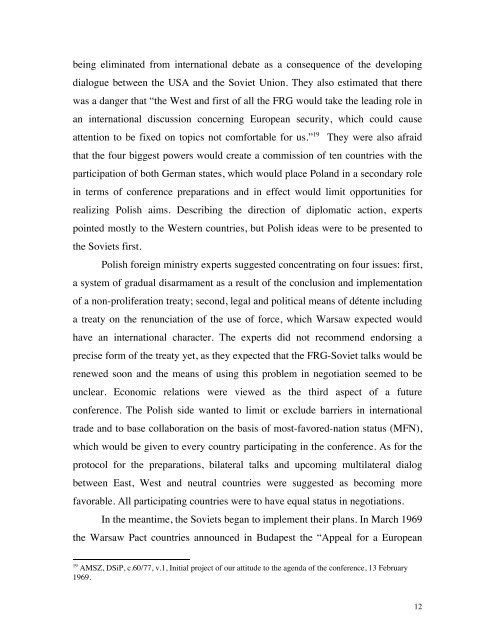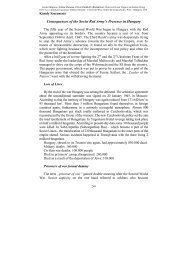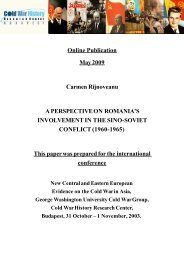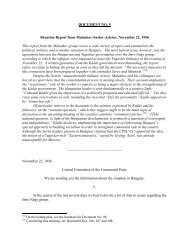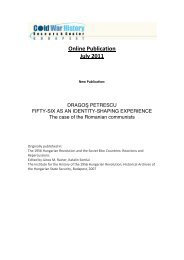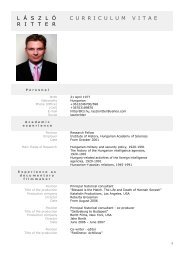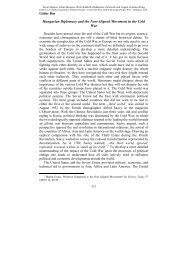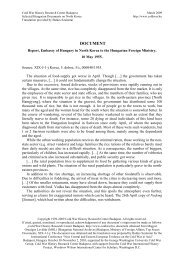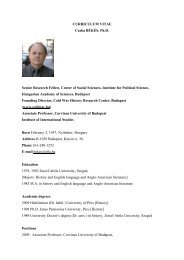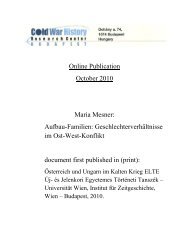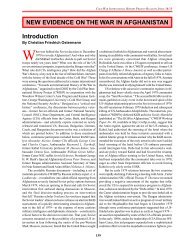Hope and Reality: Poland and the Conference on Security and ...
Hope and Reality: Poland and the Conference on Security and ...
Hope and Reality: Poland and the Conference on Security and ...
Create successful ePaper yourself
Turn your PDF publications into a flip-book with our unique Google optimized e-Paper software.
eing eliminated from internati<strong>on</strong>al debate as a c<strong>on</strong>sequence of <str<strong>on</strong>g>the</str<strong>on</strong>g> developingdialogue between <str<strong>on</strong>g>the</str<strong>on</strong>g> USA <str<strong>on</strong>g>and</str<strong>on</strong>g> <str<strong>on</strong>g>the</str<strong>on</strong>g> Soviet Uni<strong>on</strong>. They also estimated that <str<strong>on</strong>g>the</str<strong>on</strong>g>rewas a danger that “<str<strong>on</strong>g>the</str<strong>on</strong>g> West <str<strong>on</strong>g>and</str<strong>on</strong>g> first of all <str<strong>on</strong>g>the</str<strong>on</strong>g> FRG would take <str<strong>on</strong>g>the</str<strong>on</strong>g> leading role inan internati<strong>on</strong>al discussi<strong>on</strong> c<strong>on</strong>cerning European security, which could causeattenti<strong>on</strong> to be fixed <strong>on</strong> topics not comfortable for us.” 19 They were also afraidthat <str<strong>on</strong>g>the</str<strong>on</strong>g> four biggest powers would create a commissi<strong>on</strong> of ten countries with <str<strong>on</strong>g>the</str<strong>on</strong>g>participati<strong>on</strong> of both German states, which would place Pol<str<strong>on</strong>g>and</str<strong>on</strong>g> in a sec<strong>on</strong>dary rolein terms of c<strong>on</strong>ference preparati<strong>on</strong>s <str<strong>on</strong>g>and</str<strong>on</strong>g> in effect would limit opportunities forrealizing Polish aims. Describing <str<strong>on</strong>g>the</str<strong>on</strong>g> directi<strong>on</strong> of diplomatic acti<strong>on</strong>, expertspointed mostly to <str<strong>on</strong>g>the</str<strong>on</strong>g> Western countries, but Polish ideas were to be presented to<str<strong>on</strong>g>the</str<strong>on</strong>g> Soviets first.Polish foreign ministry experts suggested c<strong>on</strong>centrating <strong>on</strong> four issues: first,a system of gradual disarmament as a result of <str<strong>on</strong>g>the</str<strong>on</strong>g> c<strong>on</strong>clusi<strong>on</strong> <str<strong>on</strong>g>and</str<strong>on</strong>g> implementati<strong>on</strong>of a n<strong>on</strong>-proliferati<strong>on</strong> treaty; sec<strong>on</strong>d, legal <str<strong>on</strong>g>and</str<strong>on</strong>g> political means of détente includinga treaty <strong>on</strong> <str<strong>on</strong>g>the</str<strong>on</strong>g> renunciati<strong>on</strong> of <str<strong>on</strong>g>the</str<strong>on</strong>g> use of force, which Warsaw expected wouldhave an internati<strong>on</strong>al character. The experts did not recommend endorsing aprecise form of <str<strong>on</strong>g>the</str<strong>on</strong>g> treaty yet, as <str<strong>on</strong>g>the</str<strong>on</strong>g>y expected that <str<strong>on</strong>g>the</str<strong>on</strong>g> FRG-Soviet talks would berenewed so<strong>on</strong> <str<strong>on</strong>g>and</str<strong>on</strong>g> <str<strong>on</strong>g>the</str<strong>on</strong>g> means of using this problem in negotiati<strong>on</strong> seemed to beunclear. Ec<strong>on</strong>omic relati<strong>on</strong>s were viewed as <str<strong>on</strong>g>the</str<strong>on</strong>g> third aspect of a futurec<strong>on</strong>ference. The Polish side wanted to limit or exclude barriers in internati<strong>on</strong>altrade <str<strong>on</strong>g>and</str<strong>on</strong>g> to base collaborati<strong>on</strong> <strong>on</strong> <str<strong>on</strong>g>the</str<strong>on</strong>g> basis of most-favored-nati<strong>on</strong> status (MFN),which would be given to every country participating in <str<strong>on</strong>g>the</str<strong>on</strong>g> c<strong>on</strong>ference. As for <str<strong>on</strong>g>the</str<strong>on</strong>g>protocol for <str<strong>on</strong>g>the</str<strong>on</strong>g> preparati<strong>on</strong>s, bilateral talks <str<strong>on</strong>g>and</str<strong>on</strong>g> upcoming multilateral dialogbetween East, West <str<strong>on</strong>g>and</str<strong>on</strong>g> neutral countries were suggested as becoming morefavorable. All participating countries were to have equal status in negotiati<strong>on</strong>s.In <str<strong>on</strong>g>the</str<strong>on</strong>g> meantime, <str<strong>on</strong>g>the</str<strong>on</strong>g> Soviets began to implement <str<strong>on</strong>g>the</str<strong>on</strong>g>ir plans. In March 1969<str<strong>on</strong>g>the</str<strong>on</strong>g> Warsaw Pact countries announced in Budapest <str<strong>on</strong>g>the</str<strong>on</strong>g> “Appeal for a European19 AMSZ, DSiP, c.60/77, v.1, Initial project of our attitude to <str<strong>on</strong>g>the</str<strong>on</strong>g> agenda of <str<strong>on</strong>g>the</str<strong>on</strong>g> c<strong>on</strong>ference, 13 February1969.12


